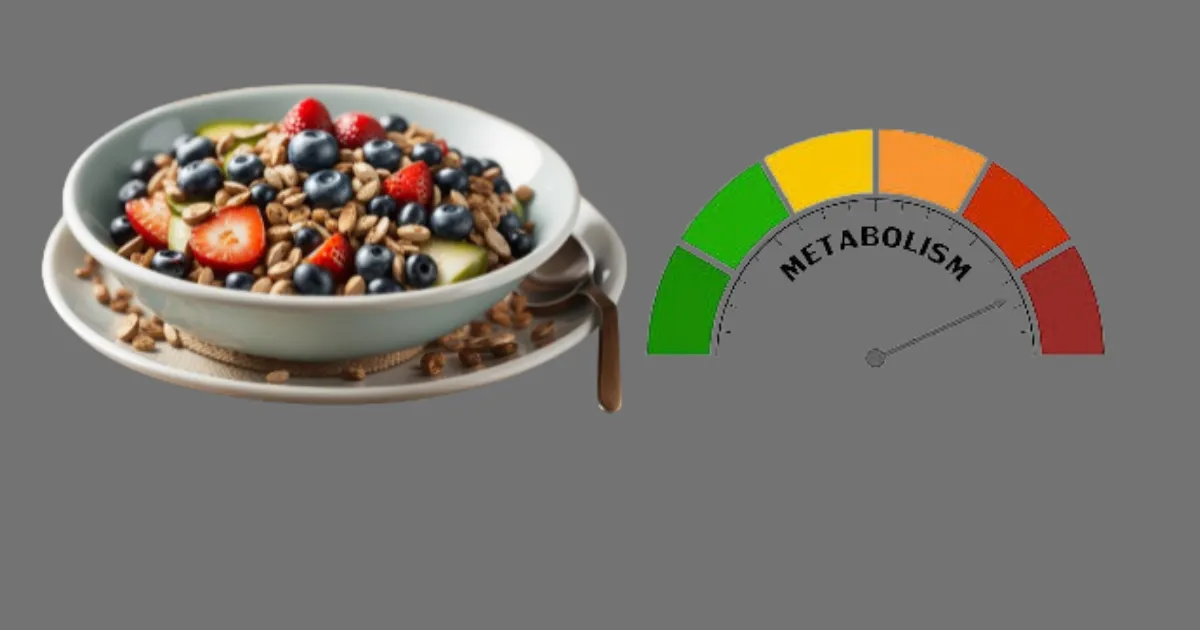comprehensive guide how to increase metabolism. In this Comprehensive guide on how to increase metabolism, we’ll explore the science of metabolism and give you practical tips on how to speed up your metabolism in a faster and healthier way.
Understanding Metabolism
Your metabolism is the engine that keeps your body running efficiently. It includes all the chemical processes that occur inside cells to maintain life. These processes include breaking down food for energy, repairing cells, and eliminating waste. Your metabolic rate, which is influenced by genetics, age and gender, determines how quickly or slowly your body burns calories.
In what ways might your metabolism be malfunctioning?
Factors affecting metabolism
- Age: As we age, our metabolism slows down, so it’s important to adopt strategies to speed it up.
- Muscle mass: Muscle burns more calories than fat, so building muscle mass through exercise will speed up your metabolic rate
- Diet: What you eat and when you eat can affect your metabolic rate. It may be helpful to include foods in your diet that boost your metabolism, such as lean proteins, whole grains, fruits, and vegetables.
- Body Size: Larger individuals have a higher BMR because they have more organs and fluids to maintain.
- Gender: Men generally have swifter metabolisms compared to women.
- Genetics: Family history and genetic disorders can affect metabolic rates.
- Physical Activity: Exercise increases muscle mass and metabolism, even at rest.
- Hormonal Factors: Imbalances like hypothyroidism or hyperthyroidism can impact metabolism.
- Environmental Factors: Extreme temperatures force the body to work harder to maintain a normal temperature, increasing BMR.
- Drugs: Substances like caffeine and nicotine can raise BMR, while certain medications may lead to weight gain regardless of diet.
This list highlights factors that can be modified to change BMR and others that cannot. By focusing on creating a healthy body and making mindful food and lifestyle choices, you can enhance your metabolism and overall well-being. Chiropractic principles emphasize minimizing interference with the nervous system, supporting optimal function, and creating a win-win situation for health.
 How to boost your metabolism
How to boost your metabolism
Stay hydrated
For an efficient metabolism, you need to drink enough water. Dehydration can slow down metabolic processes.
Drinking coffee
Studies have indicated that caffeine can stimulate the release of neurotransmitters such as epinephrine, which plays a role in regulating fat processing in the body.
Drinking coffee can significantly increase your metabolism and may help you lose weight if that is your goal.
Regular exercise
To build muscle and improve your metabolism, incorporate cardio and strength training into your routine
Eat smaller meals more often
Eating small amounts each day will help keep your metabolism active and prevent you from overeating. Choose protein: Include low-fat protein sources like chicken, fish, tofu and beans in your diet to help with muscle recovery and growth.
Enough Sleep
Try to get enough sleep every day—7 to 10 hours every night. Insufficient sleep can disrupt the balance of appetite-regulating hormones in your body and may slightly alter how your body processes fat, potentially leading to weight gain.
Manage your stress
Chronic stress can cause hormonal imbalances, which affect metabolism. Practice stress-reduction techniques like meditation or yoga. Green tea. Drinking green tea has been shown to increase metabolism slightly due to the antioxidants and catechins present in it.
Spicy food
Some spicy foods contain compounds that can temporarily speed up your metabolism. Add spices like chili to your dishes. Eating spicy food as like capsicum: Peppers contain capsaicin, a compound that can boost your metabolism.
- Capsaicin in peppers can boost metabolism.
- It may burn around 10 extra calories per meal.
- Not everyone can tolerate spicy foods at the levels needed for metabolic effects.
- Factors like individual sensitivity and gastrointestinal health play a role.
- Gradually increasing spice intake can help build tolerance.
- Spicy foods can be incorporated into various dishes for flavor.
- Moderation is key to enjoying spicy foods in a balanced diet.
- Pairing spicy foods with exercise and other lifestyle factors can enhance results.
- Other lifestyle factors, like sleep and stress management, also influence metabolism.
Consuming spicy food might help increase your metabolism and keep your weight in check. However, the impact of spicy foods on metabolism is generally minor.
Drinking of green tea and oolong tea
- Green tea and oolong tea aid in converting stored fat into free fatty acids.
- When combined with exercise, this conversion may increase fat burning.
- The teas impact the gut microbiome, improving fat breakdown and energy utilization.
- Some older research suggests these teas may not affect metabolism for everyone.
- The effects of green tea and oolong tea on metabolism may vary or be minimal.
Conclusion of Increasing Metabolism
Achieving a faster, healthier metabolism requires making lifestyle changes and conscious choices. By understanding the factors influencing metabolism and implementing practical tips, you can increase energy levels, maintain a healthy weight, and enhance overall health. Consistency, patience, and dedication are essential. With these, you can attain the vibrant lifestyle you desire.
FAQs (Frequently Asked Questions) about Increasing Metabolism
Question 1: What is metabolism?
A1: Metabolism is a series of chemical processes that occur within living organisms to maintain life. This includes converting food into energy, repairing cells, and eliminating waste.
Question 2: How does metabolism affect body weight?
Answer 2: The metabolic rate determines how many calories your body burns. The higher your metabolism, the more calories you can burn, making it easier to maintain or lose weight.
Question 3: Can you change your metabolism?
Answer 3: Although genetics influence metabolic rate, you can also influence it through lifestyle choices like diet, exercise, and hydration.
Question 4: Which foods boost metabolism?
Answer 4: Foods like lean proteins, whole grains, fruits, and vegetables can help speed up your metabolism because of their nutrients.
Question 5: Is drinking water important for metabolism?
Answer 5: Yes. Staying hydrated is important for efficient metabolic processes. Dehydration can slow down your metabolism.
Question 6: How does exercise help improve metabolism?
Answer 6: Exercise, especially strength training, increases your metabolism by increasing muscle mass, allowing you to burn more calories at rest.
Question 7: Are there any foods or drinks that can temporarily boost your metabolism?
Answer 7: Yes, some spicy foods and green tea contain compounds that may temporarily affect your metabolism.
Question 8: Does stress affect metabolism?
Answer 8: Chronic stress can cause hormonal imbalances, which affect metabolism. Stress management is important for a healthy metabolism.
Question 9: Can getting enough sleep improve your metabolism?
Answer 9: Good sleep is essential for a healthy metabolism. 7 to 9 hours every night

1 thought on “Comprehensive guide how to increase metabolism”